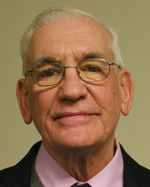By Glenn Leach
We continue to hear about disastrous flooding. In Louisiana, the damage will hurt more because few people have flood insurance as much of the flooded area had not been subject to floods in the past. Similarly, northeast Iowa has had flooding that forced the evacuation of homes and businesses in areas not normally subjected to severe flooding. Extremely heavy rains, often accompanied by high winds, have become much more common, making flooding and other damage more common even in communities relatively free from such disasters in the past.

As a result of the extreme damage in Louisiana and widespread damage elsewhere, we need to repeat the lessons learned from past disasters in Louisiana, Oklahoma and Missouri. At this time, the Baton Rouge area of Louisiana needs two things: volunteer labor and money.
There is much to do and too few to do it. As was the case in New Orleans after Hurricane Katrina, the need for volunteer workers is complicated by the fact that in many areas flooding took out motels, hotels, campgrounds and other places where volunteers could stay, and eat. Aside from totally self-contained groups (with RV-like setups), in some areas it is tough even to find places to support much-needed volunteers. It is critical that volunteers coordinate with groups on the ground who are directing the various forms of assistance.
Local folks want to avoid, as happened in New Orleans after Katrina, turning back busloads of volunteers because there is no place to house or feed them. The situation varies throughout the flood zones, so prior coordination is critical. Here are two links to organizations seeking volunteers in the flood damaged areas in
Louisiana:
http://volunteerlouisiana.gov/
http://www.nola.com/weather/index.ssf/2016/08/flooding_volunteer_help_clean.html
Almost every church, synagogue and mosque in the U.S. has organizations that respond to disasters and many of these, such as Catholic Charities, are already on site.
The other need is money. Not donated goods, but money. At the disaster sites, money can become everything from temporary housing or tools for clean-up and rebuilding to building materials, appliances contractor services and other needed items. The folks on site in the affected areas know what is needed most at that particular location and can use the money most effectively. Also, money spent in the disaster area helps the local economy recover. Within the Davenport Diocese, a special collection will be taken up Sept. 18 to aid Louisiana. The collection will go to Catholic Charities, USA, to finance work in the disaster area.
Donations of used clothing and household goods actually create problems and unnecessary costs in transportation, unloading, sorting and storage. It would be better to arrange garage sales of these items and send the proceeds to agencies operating in the area. To avoid financial contributions from going astray, it is best to send the money to Catholic Charities, Red Cross, Salvation Army or other recognized groups for effective utilization.
(Glenn Leach is a volunteer in the Diocese of Davenport’s Social Action and Immigration Office.)











